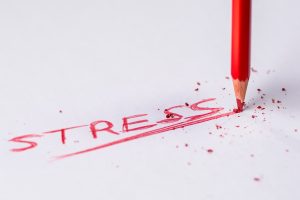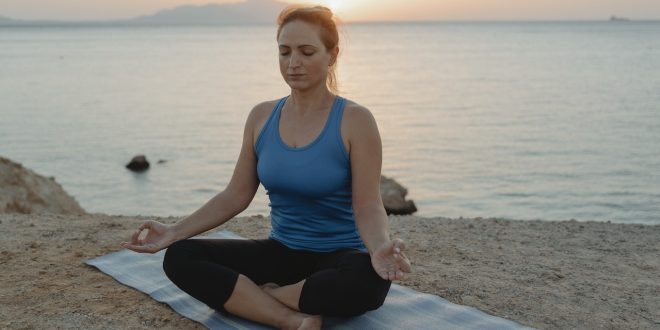Millions of women are struggling with stress daily and doing so without any tools or help to manage it. Unfortunately, unresolved stress can hurt our physical and emotional health. I know that there are some practical ways to ease stress and feel better because I have used them successfully. I would like to discuss the effects of stress on our health and provide some tips for managing it.
Here are some of my top ways to ease stress and feel better!
Recognize the Signs of Stress
 It is important to be aware of the physical and psychological signs of stress to manage it effectively. Some common signs of stress include feeling overwhelmed, irritable, or anxious; having difficulty sleeping; experiencing headaches or muscle tension; and changes in appetite. If you are experiencing any of these symptoms, it is vital to take steps to reduce your stress levels.
It is important to be aware of the physical and psychological signs of stress to manage it effectively. Some common signs of stress include feeling overwhelmed, irritable, or anxious; having difficulty sleeping; experiencing headaches or muscle tension; and changes in appetite. If you are experiencing any of these symptoms, it is vital to take steps to reduce your stress levels.
Sometimes, we won’t or can’t see how stress affects us. In this case, I recommend that you listen to your loved ones. Maybe they’ve made several comments about how you seem worried, angry, or uptight lately. Instead of brushing off their concerns, have a real conversation about anything that is bothering or pressuring you.
Identify the Source of Stress
If you become aware of the signs of stress, it’s time to identify the source(s). Keep in mind that life itself can cause stress, so we don’t need a tiger chasing us to feel pressure. Unlike an unlucky meeting with a large cat, most stressors are common and frequent. These include work, relationships, finances, and health concerns. Once you have identified the main sources of stress, you can think about what options you have to either minimize or alleviate them altogether.
Develop a Stress-Management Plan
 Once you have identified the sources of stress and considered your options, develop a plan to ease stress and feel better. There are many different ways to manage stress, and what works for one person may not work for another. For this reason, I can’t definitively tell you that any of these things will help you. We each must experiment with various things until we find what works for us.
Once you have identified the sources of stress and considered your options, develop a plan to ease stress and feel better. There are many different ways to manage stress, and what works for one person may not work for another. For this reason, I can’t definitively tell you that any of these things will help you. We each must experiment with various things until we find what works for us.
That said, here are some of the things that have helped me: daily exercise, relaxation techniques such as yoga or meditation, mindful breathing, talking to someone, and journaling. If you are unsure about where to start, talk to your doctor, therapist, or loved one about how you’re feeling. There are also many resources available online or from your local library.
Natural Remedies for Stress
Because I try to stay away from unnatural substances, natural remedies have been my staples to ease stress. Some effective natural remedies include herbs such as chamomile, valerian, passionflower, or lavender. These also come in oil form that can be diffused to promote a peaceful atmosphere in your home or office.
My family and I have also found relief from stress and anxiety from CBD oil. If they are legal where you are, you might also try oral cannabis products such as Delta 8 Gummies. I have also had great success with dietary supplements such as magnesium and L-Theanine. Natural remedies can be used in conjunction with other stress-management techniques, but I recommend that you talk to your doctor before starting new supplements and herbal remedies, especially if you take medications.
Physical Exercise
 Exercise is a great way to ease and feel better, as well as improve your overall health. Even something as simple as a brisk walk can help to reduce stress levels quickly. If you are not used to exercising, start slowly and gradually increasing the intensity and duration of your workouts. Do also consult your physician before starting a new exercise routine. There are many different types of exercise, so find one that you enjoy and that fits your schedule and lifestyle.
Exercise is a great way to ease and feel better, as well as improve your overall health. Even something as simple as a brisk walk can help to reduce stress levels quickly. If you are not used to exercising, start slowly and gradually increasing the intensity and duration of your workouts. Do also consult your physician before starting a new exercise routine. There are many different types of exercise, so find one that you enjoy and that fits your schedule and lifestyle.
In conclusion, stress is a common issue that can negatively impact our physical, emotional, and mental health if left unmanaged. Remember, if you are struggling with stress, it is important to reach out for help and try various techniques and remedies until you find relief. It might also help to track stress levels daily, so you can clearly see your trigger points and if it improves with attention over time.
**** This post is strictly informational and is not meant to replace the advice of your healthcare provider. Women’s lifelink, its owners, administrators, contributors, affiliates, vendors, authors, and editors do not claim that this information will diagnose, treat, or improve any condition or disease.
 Women's Life Link Be Well, Be Happy, Be YOU!
Women's Life Link Be Well, Be Happy, Be YOU!



